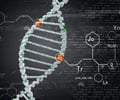In an effort to improve the diagnostic procedures in metabolic-related disorders, their treatment and the development of useful drugs, Tel Aviv University researchers have succeeded in developing a new computational approach that helps understand metabolic processes of individual organs- such as the liver, heart and brain- better.
Experts at the university's Blavatnik School of Computer Science, who have created the model, have revealed that it integrates tissue-specific information from healthy or diseased organs, and matches it to an existing model of the global human metabolic network to predict metabolic tissue behavior."(The results) establish a computational basis for the genome-wide study of normal and abnormal human metabolism in a tissue-specific manner," Nature Biotechnology quoted Professor Eytan Ruppin as saying.
The computational model describes metabolism in ten different human tissues, thereby exposing the functions in the body responsible for metabolism.
The researchers say that it may be helpful in casting light on chemical reactions that allow tissues to grow, maintain their structures, and function and respond to other bodily cues in living organisms.
While the present published work focuses on ten specific tissues, the researchers say that the new tool can be applied to other tissues also, and then potentially to entire organs.
"The previous model of human metabolism was a generic one, which did not describe how the metabolism of different tissues works. Now we can provide large scale descriptions as to how tissues metabolize different compounds and how metabolism actually works in individual organs like the heart, liver, brain or pancreas," said computer scientist Tomer Shlomi, a team member.
Advertisement
Their aim is to develop computational methods for identifying novel metabolic biomarkers that may be used for diagnosing an array of genetic metabolic disorders.
Advertisement
Highlighting the fact that the existing cancer-fighting drugs kill both cancerous and healthy cells, Professor Ruppin said that knowing the metabolism of cancer in different tissues could lead to the development of more effective and targeted.
Source-ANI
TAN/V








